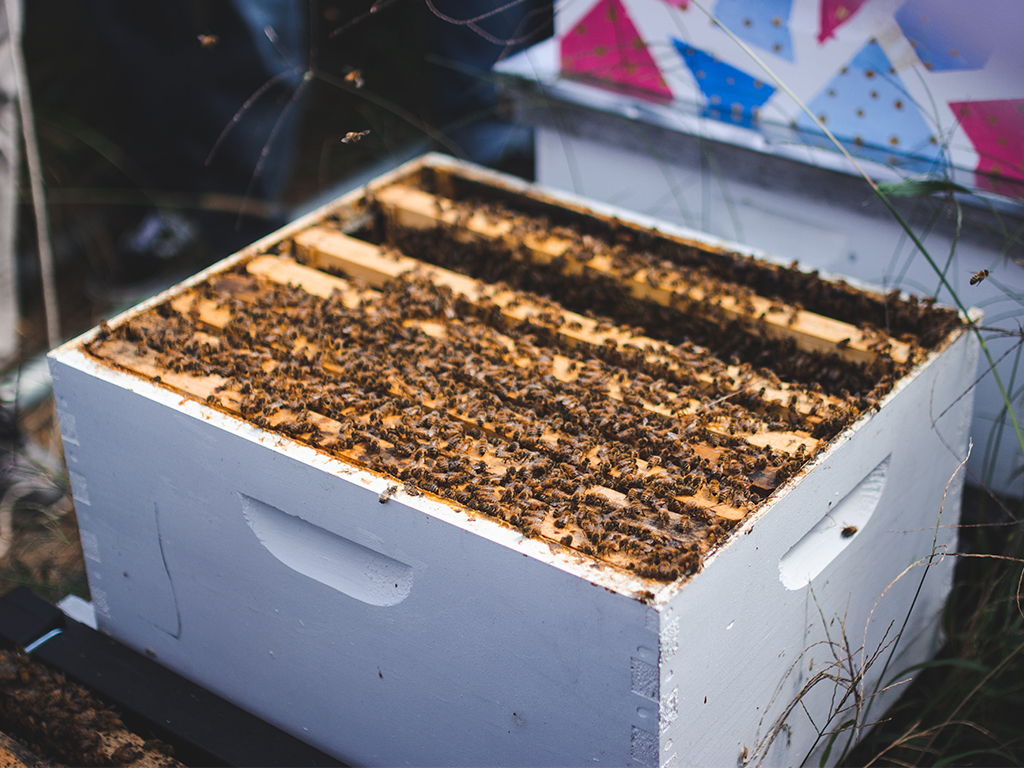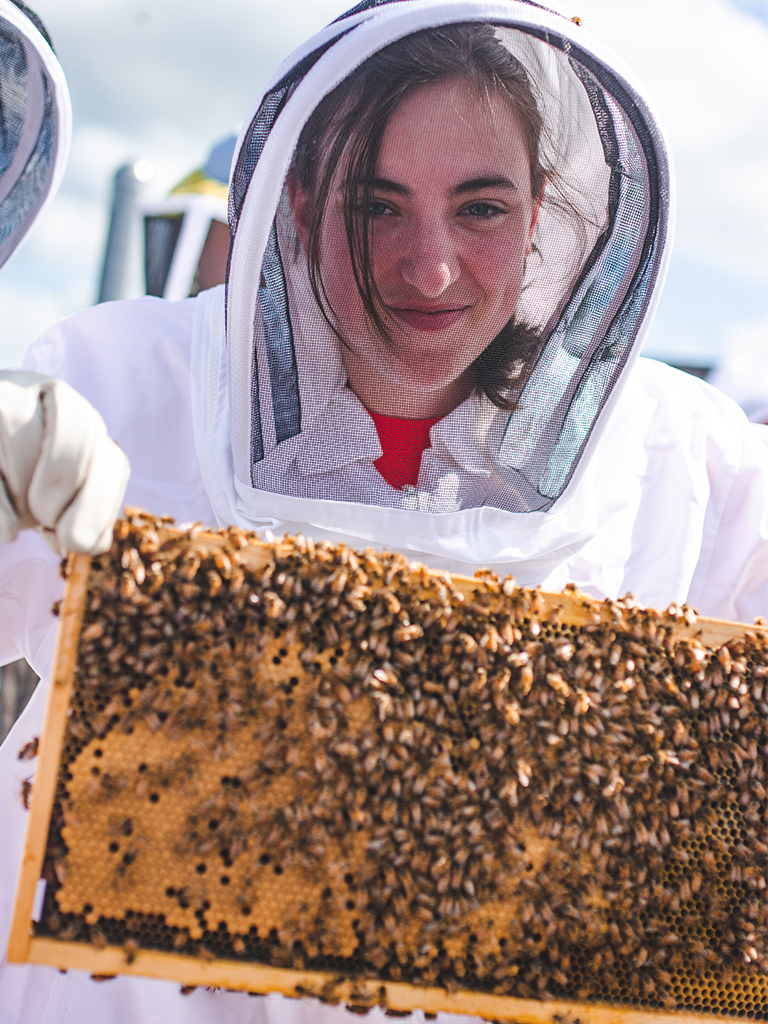“Beetween” countless student groups and “unbeelievable” resources, anyone can find a place to “bee” themselves at the University of Illinois Urbana-Champaign. Caught on yet? We sat down with Danny, a junior at UIUC and president of the Beekeeping Club, to learn about the goals and goings-on of one of our quirkiest organizations.

The Beekeeping Club is very new. Can you tell us how it got started at UIUC?
“The summer before my freshman year, I was looking around on the website to see what kind of clubs they had, and I was really surprised to see that they didn’t have a beekeeping club, because the bee research institute here is world-class. … And I was just like, ‘Why wouldn’t anyone have started a club with such good resources around?’ … So I emailed the Entomology Department, and they put me in contact with some people that work at the bee research lab. … I talked to them about it, and the student I was in contact with was really interested in the club, so we worked together and we got it started.”
How did you develop an interest in beekeeping?
“My uncle beekeeps as a hobby, and he has hives at my grandma’s house. I was always interested when I saw them in the backyard, and he would always get a bunch of honey. … They’d sell it, and people would come by because people like using local honey in baking, or people say local honey is good for your allergies. … I thought it was a fun process.”
How did you learn more about this process?
“The student from the bee research institute was a lot of help, and I read some books. I asked some people about it, and I read a lot on the internet as well. I’m not an expert by any means, but I can figure some things out. … We’ve had some guest lecturers come in, too. … We had some commercial beekeepers come in to talk about what they do.”
What is the purpose of the Beekeeping Club?
“We’re pretty interested in pursuing a better environment for pollinators in this area, and then also educating students on beekeeping in general. …. We have three hives, and we go check those out every once in a while. We do hands-on beekeeping. … Every other week we have an in-classroom meeting where we talk about what we saw at the hives last week or what we’re going to try to look for in the coming weeks, and then also just a few beekeeping skill-type things that they should know.”

How many bees do you have? Where are they located?
“At least 100,000, I guess. … They’re on the Sustainable Student Farm.”
How do you get the bees? Do you buy them?
“There are bee farms around, and I bought them from somewhere an hour or two north. They come in these cardboard boxes, and each box has five frames of bee honey and brood, and the queen is in there. And we basically bring those over here, pop them into our actual hives, and then they just get started like that. …
“Each amount of bees for the hives costs $150, so we had to get $450 for the bees this summer. And then as we got started, we got funded by the Student Sustainability Committee, and they gave us like $2,000 to get all the hives and some beekeeping equipment. We put up some fencing around the hives so they’re not blown over.”
How much honey have you harvested from the bees so far?
“None yet. … We actually got them significantly late. We just want them to make it through winter, so we left all the honey for them so they can eat that as the winter goes on. I guess we’re just kind of babying them.”
What do you plan on doing with the honey in future years once it’s ready to be harvested?
“So one jar of honey is normally like a pound, and we could get like 100 pounds and leave enough for them to make it through the winter. … The Sustainable Student Farm sells vegetables and fruits and whatever every Thursday on the Quad, so we could sell some there. Then we’d also probably do more classes like honey baking. … And then I think we would give some out to the club too or sell it to fundraise.”

A lot of people talk about the ethics of beekeeping. How do you think beekeeping helps the bees?
“There are local bees to this area that have been pretty hard hit by pesticide usage and the monoculture of people only growing corn or soybeans. And that’s not good for the bees, because the corn grows, it has pollen for however long, and then after that it’s just done. Bees need a constant food source basically throughout the warm season. …
“Ethical beekeepers also try and keep it so that when they take honey from the bees, they still have enough to make it through the winter. And then, as beekeepers are watching their bees, they’re making sure that the hive has everything they need. It’s a lot easier on the bees than if they were out in nature. They have a very secure hive that’s not just a rotting trunk of a tree or something, and then they’re also treated for any mites or diseases they may get. So I guess the bees are having an easier life, but still, you’re using them for the honey. …
“We’re both about teaching beekeeping and then helping bees. And the same problems face honeybees as local bees, so by helping honeybees, we help local bees as well, and the environment.”
How does helping bees help the environment?
“Bees are really good pollinators. Lots of the fruits and vegetables that we eat require some form of pollination, and some plants are really only pollinated by some kind of animal or insect, like a bee. So they’re necessary for those plants to fruit.”
What can an average person do to better protect bees, since they’re so important to the environment?
“As a college student that doesn’t really own land or farm, it’s a little harder. We did this thing called bee hotels, and we used recycled soda bottles and then filled them with reeds and paper straws and stuff. … Since local bees are solitary and tunneling, they’ll use those straws and reeds to lay eggs in, and then over the winter, the eggs will hang out in there and then they’ll hatch once spring starts. So you can hang something like that anywhere, and it’ll be a small addition of space for local bees.”
Do people in the club ever get stung by bees?
“I mean, yeah, people get stung maybe one time. … We provide beekeeping stuff, like a coat and gloves. And we also have just standalone bonnets with masks. And if you wear those correctly, you shouldn’t get stung. But still, some people are fine with just walking over and checking them out.”
How much work is involved per week to make sure the hives and the bees are healthy and things are running smoothly?
“The actual beekeeping isn’t that much work. You just have to make sure that there are no pests in there. They can get mites; you have to test for that and treat those. You should check every other week or so to see if they’re outgrowing the hive. The hives are modular, and you can place another box on top if the bees need it. But it’s really not more than once a week you have to look at each hive for like 45 minutes or less.”

What happens in the summer, when many students aren’t on campus?
“Last summer, we came down three times. … So we’re involved over summer. And then I’m actually working in Research Park this summer, so I’ll be here the whole time, and I’ll be able to check on the bees whenever.”
Any plans on expanding the club?
“You can do beekeeping anywhere, really, so we’re actually talking with university right now. With the ISR reconstruction, they’re making a green roof on the top, and rooftop beekeeping is actually popular in downtown areas.”
What is your favorite part of the Beekeeping Club?
“I like when you visit the hives the best. … It’s really cool seeing how from check-up to check-up they’ve built up more comb and they have more honey and there’s a bunch more eggs in the hive. And bees are really interesting in how they actually work and communicate.”
With 1,000 registered student organizations (RSOs) at UIUC, the possibilities are endless. To learn more about the Beekeeping Club and how you can get involved, check them out on Instagram.